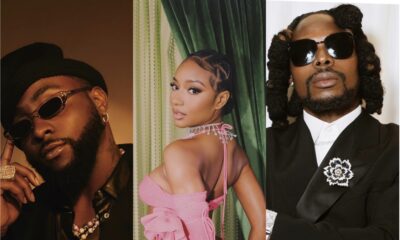Features
Ashley Okwuosa: Wizkid, Ojuelegba & the Effect of International Collaboration
 In the wake of last weekend’s surprise re-release of Wizkid’s Ojuelegba featuring Drake and Skepta, the Internet was abuzz with praise, excitement and for most Nigerians, pride. Although this is not the first time that a well-known Nigerian artiste has collaborated with an international artiste: Davido and Meek Mill or Wizkid and Tyga ; but this, this took us all, at least me by surprise.
In the wake of last weekend’s surprise re-release of Wizkid’s Ojuelegba featuring Drake and Skepta, the Internet was abuzz with praise, excitement and for most Nigerians, pride. Although this is not the first time that a well-known Nigerian artiste has collaborated with an international artiste: Davido and Meek Mill or Wizkid and Tyga ; but this, this took us all, at least me by surprise.
Drake is one of today’s most commercially successful artists with over 30 top 10 hits on the Billboard R&B/Hip Hop charts. (And one of Canada’s greatest exports.) Wizkid, on the other hand, has been immensely successful both in and out of Africa. So it kind of makes sense why this is such a huge deal.
But in the midst of all this hype, I couldn’t help but wonder what this really means for the Nigerian entertainment industry. For me, what makes this collaboration so monumental is the coming together of two successful artistes from two different countries, with two different musical backgrounds; it’s a sign that good music has no boundaries. What makes me even more proud is the fact that Wizkid has continued to reach new heights as a Nigerian artiste signed to a Nigerian label while making authentic Nigerian music. As Nigerians, we are not confused about his allegiance, and as he has continued to invest his talent and resources into the Nigerian entertainment industry, his work has continued to speak for itself.
When I think about Nigerian music, I can’t help but reminisce about Mo’hits. The now defunct label that consisted of legendary hit maker Don Jazzy, D’banj, Wande Coal, Dr Sid, D’Prince and Kayswitch. They pretty much ran the music scene and it’s safe to say that at one point, we all bellowed their famous prelude “It’s Don Jazzy, again” at the beginning of any of their hit songs. 5 albums and countless hits later, the record label disbanded under very suspicious circumstances in 2012. It was a sad day for Nigerians everywhere that had once gyrated to “Booty Call” or feigned street bravado to “Who Born The Maga.”
But in the midst of the breakup, a development that seemed like truly great news had unfolded; D’Banj would become a full-fledged member of Kanye West’s record label G.O.O.D Music.
Although we were still heartbroken at the demise of Mo’Hits, we were excited to see what D’Banj was going to do in Ammuricah. It was a feeling of pride; our local champion had been discovered by none other than Kanye West. Damn, we had made it and D’Banj was going to lead us to the Promised Land.
Well 3 years later, D’Banj has given us a 5-second cameo in the G.O.O.D music anthem, Mercy, a Sony Music Entertainment Africa deal, a newly formed record label, DB records and a slew of endorsements. These are great, but if we’re comparing Wizkid and D’Banj in terms of social relevancy, Wizkid is pushing over 3 million fans on the 3 main social media platforms (Instagram, Facebook and Twitter); and while D’Banj isn’t that far behind, Wizkid has a more active following. People anticipate Wizkid albums and collaborations and it’s not just Wizkid, but the new crop of Nigerian artists like Davido and Tiwa Savage. D’Banj on the other hand cannot touch these artists’ numbers and views.
I would like us to think, what would have happened if D’Banj and Mo’hits never parted ways? Okay, Dorobucci would probably be a different song. What would have happened if D’Banj spent more time cultivating his way back when her had fan base, and kept on making the music we loved him for.
I’m not opposed to change, but it seems like the change that we are seeing with D’Banj is a misguided attempt at rebranding himself as something he isn’t. Instead of the critical acclaim he’s expecting, he is alienating the fans that supported him from the beginning.
In my opinion, D’Banj’s relevancy has waned because we don’t recognize him anymore. He is like that uncle that gets a visitor’s visa to America, spends a couple months and returns with a misplaced American accent and clothes that are two sizes bigger than his actual size. This packaging is unnecessary and it hints at a larger problem that plagues our society – the need to be validated by people overseas. We have told ourselves that once we make it “there” we are set, but that’s obviously not the case.
This Wizkid and Drake collaboration is a big deal, but not for the banal reasons that we celebrated the D’Banj and Kanye pairing. It’s a big deal because Drake didn’t come to us to discover this African artist and take him out of his element in hopes of making him a superstar. He appreciated the music because it was GOOD, point blank.
The song is named after a slum in Lagos where Wizkid grew up, in typical grass to grace fashion, Wizkid croons about hustling his way out of his past life over a trance inducing melody that will have even the most uncoordinated person attempting a slow whine. Enter Drake who continues the thread by proclaiming his unwillingness to stop taking over charts and pretty much being Drake, Nigerian born, Skepta closes out the song with a poignant tale (No, it really is a tale. It’s almost 2 minutes long) about growing up as a poor Black boy in London. What makes this collaboration so great is the continuing thread that runs throughout the entire song which is three different men all-talking about their versions of the same story. That’s what a healthy collaboration is: appreciating our differences, acknowledging our similarities and finding a way to make something great out of it. Wizkid didn’t need to become anything that he wasn’t and the song and message will still resonate with his audience.
What I hope is that as we continue to grow as a country, we continue to amplify the things that make us “us” and ultimately make us great, and in turn, the right people will appreciate. Like they say, real recognizes real.

























